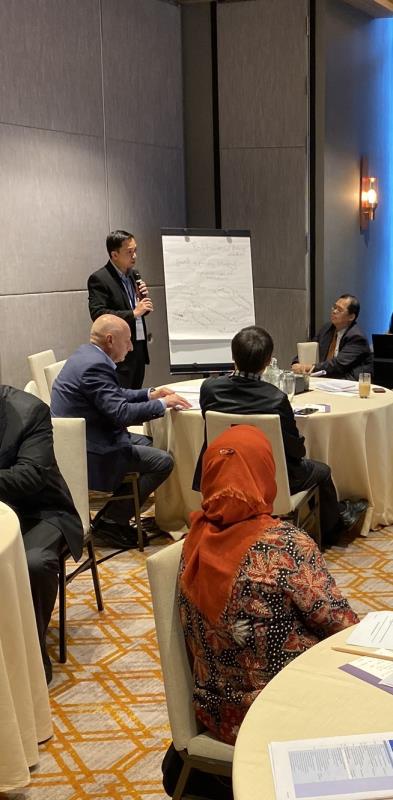 Professor Zamberi Sekawi speaking during the meeting in Bangkok.
Professor Zamberi Sekawi speaking during the meeting in Bangkok.The World Antibiotic Awareness Week took place in November 2019 and in conjunction with the event, the Antimicrobial Resistance Summit Expert Group and the Antimicrobial Stewardship Working Group convened in Bangkok, Thailand, in the final weekend of October.
The gathering is the first ever regional effort to combat the silent onslaught of worldwide antimicrobial resistance. It saw participation from 17 eminent leaders hailing from backgrounds in clinical microbiology, infection control, infectious disease, and critical care societies across Asia Pacific. Here, these leaders made actionable plans to empower governments, hospital administrators, healthcare professionals, and the public to handle this epidemic. Malaysia’s representative at the working group meeting was Professor Zamberi Sekawi, immediate past president of Malaysian Society of Infectious Diseases and Chemotherapy (MSIDC).
Professor Cheng-Hsun Chiu, director of Molecular Infectious Disease Research Center, Taoyuan Chang Gung Memorial Hospital, Taiwan, noted the importance of combined efforts among local governments, hospital administrators, and pharmaceutical companies to drive public awareness, and practice and policy change. He said: “A long-term solution involves public education, but healthcare professionals also need to be re-educated about proper antibiotic practices. We also need decision-makers and leaders at a government and institutional level to champion and drive initiatives on antimicrobial stewardship, surveillance, diagnostics, and access to novel antimicrobial agents.” The meeting was facilitated by Pfizer, which organized the logistics behind the meeting.
In an interview with MIMS Doctor, Zamberi said: “The meeting served as a platform for us to address the issue of antimicrobial resistance and antimicrobial stewardship in the region.” Antimicrobial stewardship (AMS) refers to the prudent use of the correct antibiotics, with good reason. With regard to the antimicrobial resistance (AMR) situation in the country, Zamberi describes it as “serious.” He said: “We are facing AMR [issues] in all hospitals. We have to step up AMS efforts [in all relevant areas].” The abuse of antibiotics has resulted in AMR beyond the extent of medical research and the introduction of new drugs. This means that common illnesses, once treatable with antibiotics, may become life-threatening once again, bringing us back to the pre-antibiotic era. Of particular concern are medical treatments—such as cancer therapy, organ transplantation and joint replacement—which cannot be done without antibiotics. This leads to an increase in sepsis and post-surgical infection.
MSIDC has an affiliated AMS special interest group (MAMSIG). The group has set up educational AMS programmes for all healthcare professionals including nurses, housemen, and pharmacists.
On the national level, the Ministry of Health, together with the Ministry of Agriculture, relevant non-governmental organizations (NGOs) and MSIDC are working together to address antibiotic usage not only in the human healthcare setting but also in agriculture as AMS extends beyond human use. Any antibiotics used in farming will leave residues in the environment and in the food we consume.